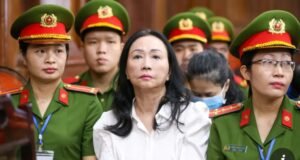Vietnamese Tycoon Receives Death Sentence for Fraud
According to state media outlet Thanh Nien, Vietnamese property tycoon Truong My Lan was handed a death sentence on Thursday in connection with the nation’s largest financial fraud case. Lan was convicted of embezzlement, bribery, and breaches of banking regulations related to lending. The court sentenced her to death for the embezzlement charges and to 20 years in prison for each of the other two offenses.
Accused of misappropriating assets from Saigon Joint Stock Commercial Bank by obtaining unauthorized loans for Van Thinh Phat and affiliated shell companies, Lan, the chairwoman of real estate development firm Van Thinh Phat Holdings Group, faced allegations related to her involvement in the bank’s affairs.
Tycoon’s Proxy Control Exposed
Local media reported that much of Lan’s defense revolved around her legal team arguing that she held only a 15% stake in the bank and lacked an official position within its hierarchy, suggesting that the embezzlement charges were unfounded.

However, witnesses with significant stakes testified in court that they were instructed to act on Lan’s behalf. Consequently, judges concluded that Lan effectively controlled over 90% of SCB through proxies and was the de facto owner of the bank, as reported by local media.
Reportedly totaling $44 billion, the loans represented over 90% of SCB’s lending from 2012 to 2022. Of this, an estimated $12.3 billion was allegedly directed to Van Thinh Phat, with additional funds reportedly used for personal purposes. Although Lan settled some of the over 1,000 loans, judges ruled that she must fully compensate the bank.
Wave of Charges in SCB Case
Lan was initially arrested in 2022, with allegations spanning approximately a decade. State media reported that over 80 individuals, including central bank officials, have been charged in connection with the case, accused of causing damage to SCB.
A family member confirmed to Reuters on Thursday that Lan plans to appeal the sentence.
The prosecution of Lan is part of a broader anti-corruption campaign led by Vietnam’s ruling Communist Party, known as the “blazing furnace.” This crackdown has led to the resignation of high-ranking politicians, including former Vietnamese presidents, and the sentencing of hundreds of officials and business figures.










